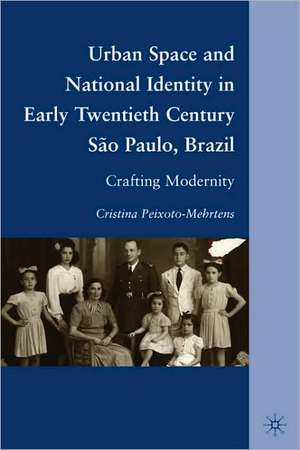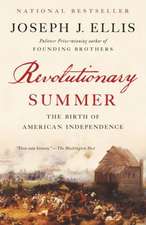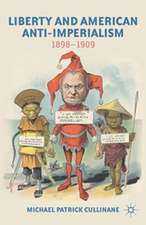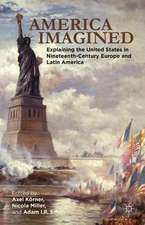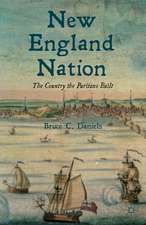Urban Space and National Identity in Early Twentieth Century São Paulo, Brazil: Crafting Modernity
Autor C. Peixoto-Mehrtensen Limba Engleză Hardback – 26 noi 2010
| Toate formatele și edițiile | Preț | Express |
|---|---|---|
| Paperback (1) | 384.70 lei 6-8 săpt. | |
| Palgrave Macmillan US – 28 oct 2015 | 384.70 lei 6-8 săpt. | |
| Hardback (1) | 388.72 lei 6-8 săpt. | |
| Palgrave Macmillan US – 26 noi 2010 | 388.72 lei 6-8 săpt. |
Preț: 388.72 lei
Nou
Puncte Express: 583
Preț estimativ în valută:
74.39€ • 80.78$ • 62.49£
74.39€ • 80.78$ • 62.49£
Carte tipărită la comandă
Livrare economică 22 aprilie-06 mai
Preluare comenzi: 021 569.72.76
Specificații
ISBN-13: 9780230103023
ISBN-10: 0230103022
Pagini: 273
Ilustrații: XIV, 273 p. 10 illus.
Dimensiuni: 140 x 216 x 23 mm
Greutate: 0.43 kg
Ediția:2010
Editura: Palgrave Macmillan US
Colecția Palgrave Macmillan
Locul publicării:New York, United States
ISBN-10: 0230103022
Pagini: 273
Ilustrații: XIV, 273 p. 10 illus.
Dimensiuni: 140 x 216 x 23 mm
Greutate: 0.43 kg
Ediția:2010
Editura: Palgrave Macmillan US
Colecția Palgrave Macmillan
Locul publicării:New York, United States
Cuprins
Public and Private: Crossed Paths in the Paulista Process of Urban Consolidation The Dynamics of Paulista Urban Institutions In the 1930s The Making of Urban Middle-Class Employees In the 1930s The Symbolic Construction of Paulista Urban Identity Politics and Urban Change: The Pacaembu Scheme, 1933-1940
Recenzii
“Mehrtens’s sources are richly varied and used withgreat insight and creativity. Her analysis is detailed, careful, andilluminating. She has written a book that will appeal to scholars of the middleclass, of public-private interactions, and of the complex process of thedevelopment modern urban space.” (Anne Hanley, Luso-Brazilian Review, Vol. 52(2), December, 2015)
"In Urban Space and National Identity in Early Twentieth Century São Paulo, Brazil, Cristina Peixoto-Mehrtens - historian, architect, and former urban planner - has written a vital book. She details the complex interactions among policy makers, bureaucrats, politicians, and scholars who defined the economic, cultural, social, and political spaces of urban São Paulo, Brazil s twentieth-century economic power house. Deftly exploring the labyrinths of state and private development agencies and drawing on an eclectic array of sources, Peixoto-Mehrtens offers fresh insight into Brazil s economic and social modernization in the twentieth century. Her tale of the construction of the Pacaembu Stadium during the late 1930s is a model microhistory of tangled social and political agendas. At the same time, she offers a new chapter in the deepening account of the role Brazil s middle class played in articulating modernity to a nation that in the early twenty-first century has become a rising global power. Recognizing that there was no unified middle-class political initiative, she penetratingly shows how bureaucrats and policy makers, acting from local conditions, interpreted and transformed the transnational traffic in theories of development and urban planning." - Brian P. Owensby, Professor and Chair, Corcoran Department of History, University of Virginia
"How did middle-class architects and city planners, municipal employees and foreign-owned companies, politicians and intellectuals all contribute to reshaping the urban spaces in São Paulo, South America s largest city, in the 1930s and 40s? Urban Space and National Identity in Early Twentieth Century São Paulo, Brazil offers a fresh interpretation of the crucial role that middle sectors played in influencing urban life in a vital center of modernizing Brazil. Through the creative use of a wide array of archives, oral histories, and varied sources, this social and cultural history artfully analyzes the complex interlocking networks of business interests, aspiring professionals, and middle-class technicians that planned and implemented the transformation of the city into Brazil s largest metropolis." - James N. Green, Professor of Brazilian History and Culture, Brown University
"In Urban Space and National Identity in Early Twentieth Century São Paulo, Brazil, Cristina Peixoto-Mehrtens - historian, architect, and former urban planner - has written a vital book. She details the complex interactions among policy makers, bureaucrats, politicians, and scholars who defined the economic, cultural, social, and political spaces of urban São Paulo, Brazil s twentieth-century economic power house. Deftly exploring the labyrinths of state and private development agencies and drawing on an eclectic array of sources, Peixoto-Mehrtens offers fresh insight into Brazil s economic and social modernization in the twentieth century. Her tale of the construction of the Pacaembu Stadium during the late 1930s is a model microhistory of tangled social and political agendas. At the same time, she offers a new chapter in the deepening account of the role Brazil s middle class played in articulating modernity to a nation that in the early twenty-first century has become a rising global power. Recognizing that there was no unified middle-class political initiative, she penetratingly shows how bureaucrats and policy makers, acting from local conditions, interpreted and transformed the transnational traffic in theories of development and urban planning." - Brian P. Owensby, Professor and Chair, Corcoran Department of History, University of Virginia
"How did middle-class architects and city planners, municipal employees and foreign-owned companies, politicians and intellectuals all contribute to reshaping the urban spaces in São Paulo, South America s largest city, in the 1930s and 40s? Urban Space and National Identity in Early Twentieth Century São Paulo, Brazil offers a fresh interpretation of the crucial role that middle sectors played in influencing urban life in a vital center of modernizing Brazil. Through the creative use of a wide array of archives, oral histories, and varied sources, this social and cultural history artfully analyzes the complex interlocking networks of business interests, aspiring professionals, and middle-class technicians that planned and implemented the transformation of the city into Brazil s largest metropolis." - James N. Green, Professor of Brazilian History and Culture, Brown University
Notă biografică
CRISTINA PEIXOTO-MEHRTENS is Assistant Professor at the University of Massachusetts, USA.
